
- Ancient Rome
- Medieval England
- Stuart England
- World War One
- World War Two
- Modern World History
- Philippines
- History Learning >
- The German Reformation >
- The 95 Theses
On 31 October 1517, Martin Luther pinned the 95 Theses next to the sale of indulgences to the door of the main church in Wittenberg. Although Luther could never have foreseen the impact of this act, it served to trigger the German Reformation. The main idea of the 95 Theses was that the Church’s teaching on salvation were incorrect and that the Bible revealed God’s true will.
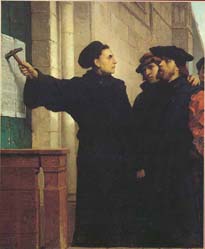
In his early years, Luther had accepted the teachings of the Church. However, over time they began to trouble him. He feared that he would never gain salvation, as leading a completely sin-free life was almost impossible. His despair worsened when, in 1517, the Dominican friar John Tetzel was empowered by the pope to fund the restoration of buildings in Rome by selling indulgences. Tetzel’s sermons became advertisements for the expensive indulgences, which would ensure the forgiveness of all the purchaser’s sins. It also promised the release of a loved one from purgatory. Churchgoers would sing:
“As soon as the coin in the coffer rings, So the soul from purgatory springs.”
Luther felt that the Church was exploiting its members for its own gain. He saw it as an example of the “rottenness” of the Church.
The Church’s actions inspired Luther to write The 95 Theses. The pamphlet contained 95 points that he felt should be argued at an academic level.
Whether Luther intended for his pamphlet to be read by a wide audience is up for debate. On the one hand, it was written in Latin which was the traditional language of the scholar. Thus, few people in Wittenberg would have been able to read it.
On the other hand, the timing suggests that he was hoping for his arguments to receive wide publicity. The 95 Theses appeared only the day before the Elector of Saxony sold indulgences to visitors of his holy relics.
Even if Luther didn’t intend for it to happen, the 95 Theses were soon translated into German, printed and widely distributed. His ideas had wide appeal - scholars approved of the theory behind Luther’s arguments, and the public were happy to find they could have salvation regardless of their wealth.
Luther’s ideas spread across Germany through the traders that travelled through Wittenberg. Moreover, it helped that his ideas had a populist appeal.
See also: The 95 Theses - A Modern Translation

MLA Citation/Reference
"The 95 Theses". HistoryLearning.com. 2024. Web.
Related Pages
- Quotes from the Nuremberg Trials
- Germany in 1900
- Germany 1939
- General Kurt Student
- General Dietrich von Choltitz
- Heinz Guderian
- Erwin Rommel
- Erhard Milch
- Wilhelm Canaris
Search a pre-defined list
The Whole Bible The Old Testament The New Testament ────────────── Pentateuch Historical Books Poetical Books Wisdom Literature Prophets Major Prophets Minor Prophets ────────────── The Gospels Luke-Acts Pauline Epistles General Epistles Johannine Writings ────────────── Genesis Exodus Leviticus Numbers Deuteronomy Joshua Judges Ruth 1 Samuel 2 Samuel 1 Kings 2 Kings 1 Chronicles 2 Chronicles Ezra Nehemiah Esther Job Psalms Proverbs Ecclesiastes Song of Songs Isaiah Jeremiah Lamentations Ezekiel Daniel Hosea Joel Amos Obadiah Jonah Micah Nahum Habakkuk Zephaniah Haggai Zechariah Malachi Matthew Mark Luke John Acts Romans 1 Corinthians 2 Corinthians Galatians Ephesians Philippians Colossians 1 Thessalonians 2 Thessalonians 1 Timothy 2 Timothy Titus Philemon Hebrews James 1 Peter 2 Peter 1 John 2 John 3 John Jude Revelation
OR Select a range of biblical books
Select a Beginning Point Genesis Exodus Leviticus Numbers Deuteronomy Joshua Judges Ruth 1 Samuel 2 Samuel 1 Kings 2 Kings 1 Chronicles 2 Chronicles Ezra Nehemiah Esther Job Psalms Proverbs Ecclesiastes Song of Songs Isaiah Jeremiah Lamentations Ezekiel Daniel Hosea Joel Amos Obadiah Jonah Micah Nahum Habakkuk Zephaniah Haggai Zechariah Malachi Matthew Mark Luke John Acts Romans 1 Corinthians 2 Corinthians Galatians Ephesians Philippians Colossians 1 Thessalonians 2 Thessalonians 1 Timothy 2 Timothy Titus Philemon Hebrews James 1 Peter 2 Peter 1 John 2 John 3 John Jude Revelation
Select an Ending Point Genesis Exodus Leviticus Numbers Deuteronomy Joshua Judges Ruth 1 Samuel 2 Samuel 1 Kings 2 Kings 1 Chronicles 2 Chronicles Ezra Nehemiah Esther Job Psalms Proverbs Ecclesiastes Song of Songs Isaiah Jeremiah Lamentations Ezekiel Daniel Hosea Joel Amos Obadiah Jonah Micah Nahum Habakkuk Zephaniah Haggai Zechariah Malachi Matthew Mark Luke John Acts Romans 1 Corinthians 2 Corinthians Galatians Ephesians Philippians Colossians 1 Thessalonians 2 Thessalonians 1 Timothy 2 Timothy Titus Philemon Hebrews James 1 Peter 2 Peter 1 John 2 John 3 John Jude Revelation
OR Custom Selection:
Use semicolons to separate groups: 'Gen;Jdg;Psa-Mal' or 'Rom 3-12;Mat 1:15;Mat 5:12-22'

Click to Change
Return to Top

Martin Luther :: Ninety-Five Theses on the Power of Indulgences

Disputation on the Power and Efficacy of Indulgences
In 1517, Martin Luther, an Augustinian monk posted upon the door of the Castle Church in Wittenberg (in the manner common to those issuing bulletin of an upcoming event or debate) the Ninety-Five Theses on the Power of Indulgences , what has commonly become known as The Ninety-Five Theses . The contents of his posting challenged the current teaching of the Church on penance and indulgences, questioning as well the authority of the pope. Reaction to Luther's Theses was immediate and strong, leading to his excommunication from the Roman Church and the eventual birth of the Protestant Reformation. Luther's historically important defense of the gospel is noted and celebrated annually on 31 October, Reformation Day. The following is the translated text of the Ninety-Five Theses .
Out of love and concern for the truth, and with the object of eliciting it, the following heads will be the subject of a public discussion at Wittenberg under the presidency of the reverend father, Martin Luther, Augustinian, Master of Arts and Sacred Theology, and duly appointed Lecturer on these subjects in that place. He requests that whoever cannot be present personally to debate the matter orally will do so in absence in writing.
- When our Lord and Master, Jesus Christ, said "Repent", He called for the entire life of believers to be one of repentance.
- The word cannot be properly understood as referring to the sacrament of penance, i.e. confession and satisfaction, as administered by the clergy.
- Yet its meaning is not restricted to repentance in one's heart; for such repentance is null unless it produces outward signs in various mortifications of the flesh.
- As long as hatred of self abides (i.e. true inward repentance) the penalty of sin abides, viz., until we enter the kingdom of heaven.
- The pope has neither the will nor the power to remit any penalties beyond those imposed either at his own discretion or by canon law.
- The pope himself cannot remit guilt, but only declare and confirm that it has been remitted by God; or, at most, he can remit it in cases reserved to his discretion. Except for these cases, the guilt remains untouched.
- God never remits guilt to anyone without, at the same time, making him humbly submissive to the priest, His representative.
- The penitential canons apply only to men who are still alive, and, according to the canons themselves, none applies to the dead.
- Accordingly, the Holy Spirit, acting in the person of the pope, manifests grace to us, by the fact that the papal regulations always cease to apply at death, or in any hard case.
- It is a wrongful act, due to ignorance, when priests retain the canonical penalties on the dead in purgatory.
- When canonical penalties were changed and made to apply to purgatory, surely it would seem that tares were sown while the bishops were asleep.
- In former days, the canonical penalties were imposed, not after, but before absolution was pronounced; and were intended to be tests of true contrition.
- Death puts an end to all the claims of the Church; even the dying are already dead to the canon laws, and are no longer bound by them.
- Defective piety or love in a dying person is necessarily accompanied by great fear, which is greatest where the piety or love is least.
- This fear or horror is sufficient in itself, whatever else might be said, to constitute the pain of purgatory, since it approaches very closely to the horror of despair.
- There seems to be the same difference between hell, purgatory, and heaven as between despair, uncertainty, and assurance.
- Of a truth, the pains of souls in purgatory ought to be abated, and charity ought to be proportionately increased.
- Moreover, it does not seem proved, on any grounds of reason or Scripture, that these souls are outside the state of merit, or unable to grow in grace.
- Nor does it seem proved to be always the case that they are certain and assured of salvation, even if we are very certain ourselves.
- Therefore the pope, in speaking of the plenary remission of all penalties, does not mean "all" in the strict sense, but only those imposed by himself.
- Hence those who preach indulgences are in error when they say that a man is absolved and saved from every penalty by the pope's indulgences.
- Indeed, he cannot remit to souls in purgatory any penalty which canon law declares should be suffered in the present life.
- If plenary remission could be granted to anyone at all, it would be only in the cases of the most perfect, i.e. to very few.
- It must therefore be the case that the major part of the people are deceived by that indiscriminate and high-sounding promise of relief from penalty.
- The same power as the pope exercises in general over purgatory is exercised in particular by every single bishop in his bishopric and priest in his parish.
- The pope does excellently when he grants remission to the souls in purgatory on account of intercessions made on their behalf, and not by the power of the keys (which he cannot exercise for them).
- There is no divine authority for preaching that the soul flies out of the purgatory immediately the money clinks in the bottom of the chest.
- It is certainly possible that when the money clinks in the bottom of the chest avarice and greed increase; but when the church offers intercession, all depends in the will of God.
- Who knows whether all souls in purgatory wish to be redeemed in view of what is said of St. Severinus and St. Pascal? (Note: Paschal I, pope 817-24. The legend is that he and Severinus were willing to endure the pains of purgatory for the benefit of the faithful).
- No one is sure of the reality of his own contrition, much less of receiving plenary forgiveness.
- Rare as is the man that is truly penitent, so rare is also the man who truly buys indulgences, i.e., such men are most rare.
- All those who believe themselves certain of their own salvation by means of letters of indulgence, will be eternally damned, together with their teachers.
- We should be most carefully on our guard against those who say that the papal indulgences are an inestimable divine gift, and that a man is reconciled to God by them.
- For the grace conveyed by these indulgences relates simply to the penalties of the sacramental "satisfactions" decreed merely by man.
- It is not in accordance with Christian doctrines to preach and teach that those who buy off souls, or purchase confessional licenses, have no need to repent of their own sins.
- Any Christian whatsoever, who is truly repentant, enjoys plenary remission from penalty and guilt, and this is given him without letters of indulgence.
- Any true Christian whatsoever, living or dead, participates in all the benefits of Christ and the Church; and this participation is granted to him by God without letters of indulgence.
- Yet the pope's remission and dispensation are in no way to be despised, for, as already said, they proclaim the divine remission.
- It is very difficult, even for the most learned theologians, to extol to the people the great bounty contained in the indulgences, while, at the same time, praising contrition as a virtue.
- A truly contrite sinner seeks out, and loves to pay, the penalties of his sins; whereas the very multitude of indulgences dulls men's consciences, and tends to make them hate the penalties.
- Papal indulgences should only be preached with caution, lest people gain a wrong understanding, and think that they are preferable to other good works: those of love.
- Christians should be taught that the pope does not at all intend that the purchase of indulgences should be understood as at all comparable with the works of mercy.
- Christians should be taught that one who gives to the poor, or lends to the needy, does a better action than if he purchases indulgences.
- Because, by works of love, love grows and a man becomes a better man; whereas, by indulgences, he does not become a better man, but only escapes certain penalties.
- Christians should be taught that he who sees a needy person, but passes him by although he gives money for indulgences, gains no benefit from the pope's pardon, but only incurs the wrath of God.
- Christians should be taught that, unless they have more than they need, they are bound to retain what is only necessary for the upkeep of their home, and should in no way squander it on indulgences.
- Christians should be taught that they purchase indulgences voluntarily, and are not under obligation to do so.
- Christians should be taught that, in granting indulgences, the pope has more need, and more desire, for devout prayer on his own behalf than for ready money.
- Christians should be taught that the pope's indulgences are useful only if one does not rely on them, but most harmful if one loses the fear of God through them.
- Christians should be taught that, if the pope knew the exactions of the indulgence-preachers, he would rather the church of St. Peter were reduced to ashes than be built with the skin, flesh, and bones of the sheep.
- Christians should be taught that the pope would be willing, as he ought if necessity should arise, to sell the church of St. Peter, and give, too, his own money to many of those from whom the pardon-merchants conjure money.
- It is vain to rely on salvation by letters of indulgence, even if the commissary, or indeed the pope himself, were to pledge his own soul for their validity.
- Those are enemies of Christ and the pope who forbid the word of God to be preached at all in some churches, in order that indulgences may be preached in others.
- The word of God suffers injury if, in the same sermon, an equal or longer time is devoted to indulgences than to that word.
- The pope cannot help taking the view that if indulgences (very small matters) are celebrated by one bell, one pageant, or one ceremony, the gospel (a very great matter) should be preached to the accompaniment of a hundred bells, a hundred processions, a hundred ceremonies.
- The treasures of the church, out of which the pope dispenses indulgences, are not sufficiently spoken of or known among the people of Christ.
- That these treasures are not temporal are clear from the fact that many of the merchants do not grant them freely, but only collect them.
- Nor are they the merits of Christ and the saints, because, even apart from the pope, these merits are always working grace in the inner man, and working the cross, death, and hell in the outer man.
- St. Laurence said that the poor were the treasures of the church, but he used the term in accordance with the custom of his own time.
- We do not speak rashly in saying that the treasures of the church are the keys of the church, and are bestowed by the merits of Christ.
- For it is clear that the power of the pope suffices, by itself, for the remission of penalties and reserved cases.
- The true treasure of the church is the Holy gospel of the glory and the grace of God.
- It is right to regard this treasure as most odious, for it makes the first to be the last.
- On the other hand, the treasure of indulgences is most acceptable, for it makes the last to be the first.
- Therefore the treasures of the gospel are nets which, in former times, they used to fish for men of wealth.
- The treasures of the indulgences are the nets to-day which they use to fish for men of wealth.
- The indulgences, which the merchants extol as the greatest of favours, are seen to be, in fact, a favourite means for money-getting.
- Nevertheless, they are not to be compared with the grace of God and the compassion shown in the Cross.
- Bishops and curates, in duty bound, must receive the commissaries of the papal indulgences with all reverence.
- But they are under a much greater obligation to watch closely and attend carefully lest these men preach their own fancies instead of what the pope commissioned.
- Let him be anathema and accursed who denies the apostolic character of the indulgences.
- On the other hand, let him be blessed who is on his guard against the wantonness and license of the pardon-merchant's words.
- In the same way, the pope rightly excommunicates those who make any plans to the detriment of the trade in indulgences.
- It is much more in keeping with his views to excommunicate those who use the pretext of indulgences to plot anything to the detriment of holy love and truth.
- It is foolish to think that papal indulgences have so much power that they can absolve a man even if he has done the impossible and violated the mother of God.
- We assert the contrary, and say that the pope's pardons are not able to remove the least venial of sins as far as their guilt is concerned.
- When it is said that not even St. Peter, if he were now pope, could grant a greater grace, it is blasphemy against St. Peter and the pope.
- We assert the contrary, and say that he, and any pope whatever, possesses greater graces, viz., the gospel, spiritual powers, gifts of healing, etc., as is declared in I Corinthians 12 [:28] .
- It is blasphemy to say that the insignia of the cross with the papal arms are of equal value to the cross on which Christ died.
- The bishops, curates, and theologians, who permit assertions of that kind to be made to the people without let or hindrance, will have to answer for it.
- This unbridled preaching of indulgences makes it difficult for learned men to guard the respect due to the pope against false accusations, or at least from the keen criticisms of the laity.
- They ask, e.g.: Why does not the pope liberate everyone from purgatory for the sake of love (a most holy thing) and because of the supreme necessity of their souls? This would be morally the best of all reasons. Meanwhile he redeems innumerable souls for money, a most perishable thing, with which to build St. Peter's church, a very minor purpose.
- Again: Why should funeral and anniversary masses for the dead continue to be said? And why does not the pope repay, or permit to be repaid, the benefactions instituted for these purposes, since it is wrong to pray for those souls who are now redeemed?
- Again: Surely this is a new sort of compassion, on the part of God and the pope, when an impious man, an enemy of God, is allowed to pay money to redeem a devout soul, a friend of God; while yet that devout and beloved soul is not allowed to be redeemed without payment, for love's sake, and just because of its need of redemption.
- Again: Why are the penitential canon laws, which in fact, if not in practice, have long been obsolete and dead in themselves-why are they, to-day, still used in imposing fines in money, through the granting of indulgences, as if all the penitential canons were fully operative?
- Again: since the pope's income to-day is larger than that of the wealthiest of wealthy men, why does he not build this one church of St. Peter with his own money, rather than with the money of indigent believers?
- Again: What does the pope remit or dispense to people who, by their perfect repentance, have a right to plenary remission or dispensation?
- Again: Surely a greater good could be done to the church if the pope were to bestow these remissions and dispensations, not once, as now, but a hundred times a day, for the benefit of any believer whatever.
- What the pope seeks by indulgences is not money, but rather the salvation of souls; why then does he suspend the letters and indulgences formerly conceded, and still as efficacious as ever?
- These questions are serious matters of conscience to the laity. To suppress them by force alone, and not to refute them by giving reasons, is to expose the church and the pope to the ridicule of their enemies, and to make Christian people unhappy.
- If therefore, indulgences were preached in accordance with the spirit and mind of the pope, all these difficulties would be easily overcome, and indeed, cease to exist.
- Away, then, with those prophets who say to Christ's people, "Peace, peace," where in there is no peace.
- Hail, hail to all those prophets who say to Christ's people, "The cross, the cross," where there is no cross.
- Christians should be exhorted to be zealous to follow Christ, their Head, through penalties, deaths, and hells.
- And let them thus be more confident of entering heaven through many tribulations rather than through a false assurance of peace.
Search Results in Other Versions
Search results by book, blb searches, search the bible.
Advanced Options
There are options set in 'Advanced Options'
Theological FAQs
Other Searches
Multi-Verse Retrieval
* 'Number Delimiters' only apply to 'Paragraph Order'
Let's Connect
Daily devotionals.
Blue Letter Bible offers several daily devotional readings in order to help you refocus on Christ and the Gospel of His peace and righteousness.
- BLB Daily Promises
- Day by Day by Grace
- Morning and Evening
- Faith's Checkbook
- Daily Bible Reading
Daily Bible Reading Plans
Recognizing the value of consistent reflection upon the Word of God in order to refocus one's mind and heart upon Christ and His Gospel of peace, we provide several reading plans designed to cover the entire Bible in a year.
One-Year Plans
- Chronological
- Old Testament and New Testament Together
Two-Year Plan
- Canonical Five Day Plan
Recently Popular Pages
- Spurgeon's Morning and Evening
- G4151 - pneuma - Strong's Greek Lexicon (kjv)
- H1961 - hāyâ - Strong's Hebrew Lexicon (kjv)
- The Three Days and the Three Nights - Study Resources
- G4160 - poieō - Strong's Greek Lexicon (kjv)
- The King's Highway by C. H. Spurgeon
- G3588 - ho - Strong's Greek Lexicon (kjv)
- H5377 - nāšā' - Strong's Hebrew Lexicon (kjv)
- G1722 - en - Strong's Greek Lexicon (kjv)
Recently Popular Media
- Jehovah's Witnesses, Jesus and the Holy Trinity (Walter Martin)
- Intro. - Universal Beginnings (Chuck Missler)
- Peter's Second Sermon (Chuck Missler)
- Luke 15:1 (Bob Davis)
- Revelation 4-6 (1982-85 Audio) (Chuck Smith)
- Revelation 4 [1990s] (Chuck Missler)
- Hab 1-2:1-4 (Chuck Missler)
- The First Persecution (Chuck Missler)
- Leviticus 1-10 (1979-82 Audio) (Chuck Smith)
- Creation or Re-Creation (Chuck Missler)
CONTENT DISCLAIMER:
The Blue Letter Bible ministry and the BLB Institute hold to the historical, conservative Christian faith, which includes a firm belief in the inerrancy of Scripture. Since the text and audio content provided by BLB represent a range of evangelical traditions, all of the ideas and principles conveyed in the resource materials are not necessarily affirmed, in total, by this ministry.

Blue Letter Bible
Login to your account.
Email / username or password was incorrect!
Check your email for password retrieval
Keep me logged in!
Did you forget your password?
Register a new BLB account
Complete the form below to register [?]
Error: That Email is already registered
Error: Please provide a valid Email
Error: Passwords should have at least 6 characters
Error: Passwords do not match
Error: Please provide a valid first name
Error: That username is already taken
Error: Usernames should only contain letters, numbers, dots, dashes, or underscores
← Login to Your Account
Passwords should have at least 6 characters. Usernames should only contain letters, numbers, dots, dashes, or underscores.
Thank you for registering. A verification email has been sent to the address you provided.
Did You Know BLB Is User Supported?
Your partnership makes all we do possible. Would you prayerfully consider a gift of support today?
Cookie Notice: Our website uses cookies to store user preferences. By proceeding, you consent to our cookie usage. Please see Blue Letter Bible's Privacy Policy for cookie usage details.
Old Testament
New testament.
- History Classics
- Your Profile
- Find History on Facebook (Opens in a new window)
- Find History on Twitter (Opens in a new window)
- Find History on YouTube (Opens in a new window)
- Find History on Instagram (Opens in a new window)
- Find History on TikTok (Opens in a new window)
- This Day In History
- History Podcasts
- History Vault
This Day In History : October 31
Changing the day will navigate the page to that given day in history. You can navigate days by using left and right arrows
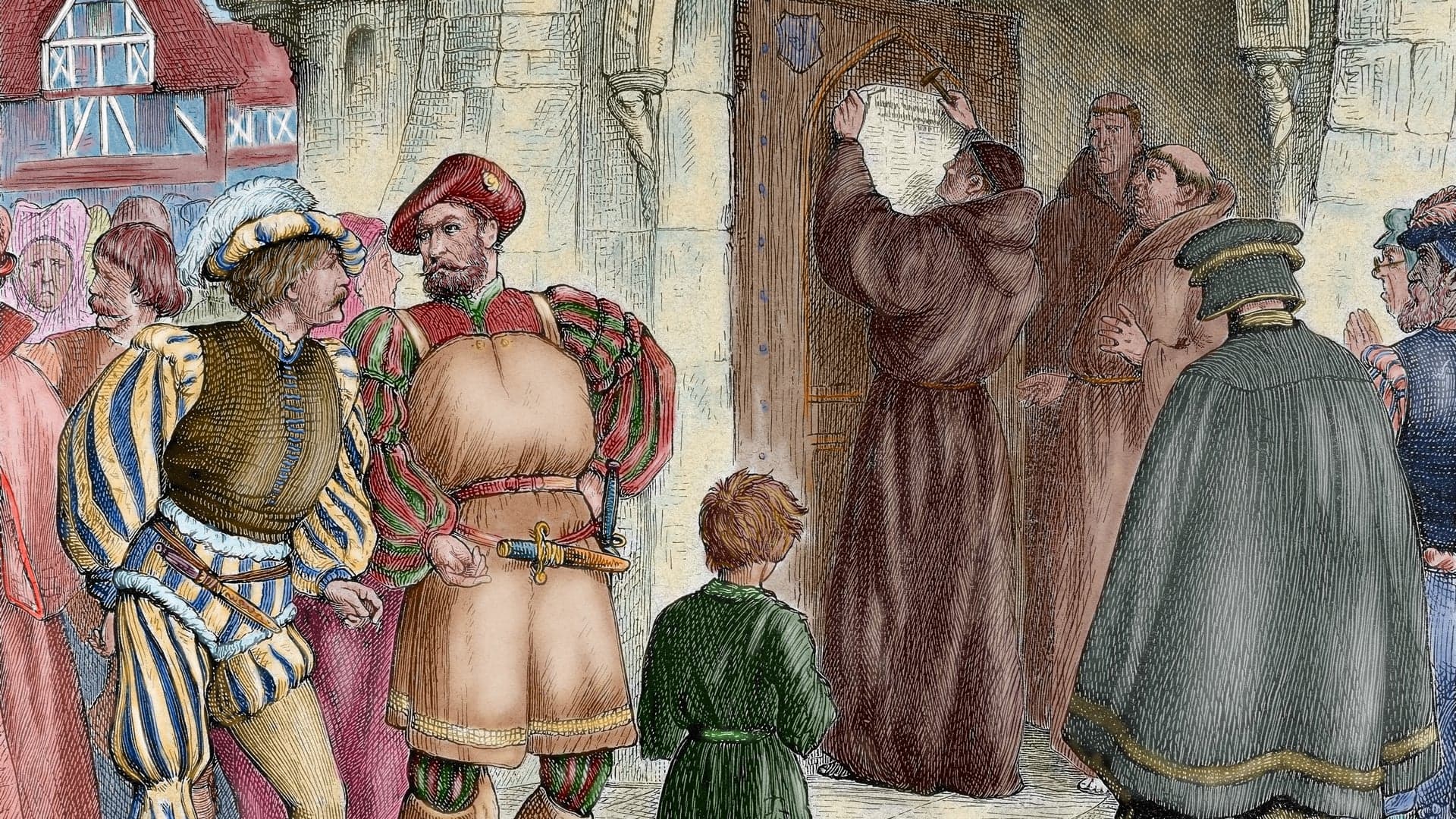
Martin Luther posts 95 theses
On October 31, 1517, legend has it that the priest and scholar Martin Luther approaches the door of the Castle Church in Wittenberg, Germany, and nails a piece of paper to it containing the 95 revolutionary opinions that would begin the Protestant Reformation .
In his theses, Luther condemned the excesses and corruption of the Roman Catholic Church, especially the papal practice of asking payment—called “indulgences”—for the forgiveness of sins. At the time, a Dominican priest named Johann Tetzel, commissioned by the Archbishop of Mainz and Pope Leo X, was in the midst of a major fundraising campaign in Germany to finance the renovation of St. Peter’s Basilica in Rome. Though Prince Frederick III the Wise had banned the sale of indulgences in Wittenberg, many church members traveled to purchase them. When they returned, they showed the pardons they had bought to Luther, claiming they no longer had to repent for their sins.
Luther’s frustration with this practice led him to write the 95 Theses, which were quickly snapped up, translated from Latin into German and distributed widely. A copy made its way to Rome, and efforts began to convince Luther to change his tune. He refused to keep silent, however, and in 1521 Pope Leo X formally excommunicated Luther from the Catholic Church. That same year, Luther again refused to recant his writings before the Holy Roman Emperor Charles V of Germany, who issued the famous Edict of Worms declaring Luther an outlaw and a heretic and giving permission for anyone to kill him without consequence. Protected by Prince Frederick, Luther began working on a German translation of the Bible, a task that took 10 years to complete.
The term “Protestant” first appeared in 1529, when Charles V revoked a provision that allowed the ruler of each German state to choose whether they would enforce the Edict of Worms. A number of princes and other supporters of Luther issued a protest, declaring that their allegiance to God trumped their allegiance to the emperor. They became known to their opponents as Protestants; gradually this name came to apply to all who believed the Church should be reformed, even those outside Germany. By the time Luther died, of natural causes, in 1546, his revolutionary beliefs had formed the basis for the Protestant Reformation, which would over the next three centuries revolutionize Western civilization.
Also on This Day in History October | 31

Freak explosion at Indiana State Fairgrounds Coliseum kills nearly 100
Violet palmer becomes first woman to officiate an nba game, this day in history video: what happened on october 31, stalin’s body removed from lenin’s tomb, celebrated magician harry houdini dies, earl lloyd becomes first black player in the nba.

Wake Up to This Day in History
Sign up now to learn about This Day in History straight from your inbox. Get all of today's events in just one email featuring a range of topics.
By submitting your information, you agree to receive emails from HISTORY and A+E Networks. You can opt out at any time. You must be 16 years or older and a resident of the United States.
More details : Privacy Notice | Terms of Use | Contact Us
The U.S. Congress admits Nevada as the 36th state
Ed sullivan witnesses beatlemania firsthand, paving the way for the british invasion, actor river phoenix dies, indian prime minister indira gandhi is assassinated, king george iii speaks for first time since american independence declared.
Martin Luther
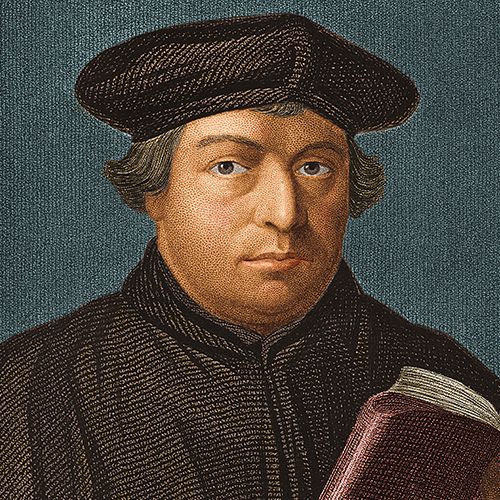
(1483-1546)
Who Was Martin Luther?
Luther called into question some of the basic tenets of Roman Catholicism, and his followers soon split from the Roman Catholic Church to begin the Protestant tradition. His actions set in motion tremendous reform within the Church.
A prominent theologian, Luther’s desire for people to feel closer to God led him to translate the Bible into the language of the people, radically changing the relationship between church leaders and their followers.
Luther was born on November 10, 1483, in Eisleben, Saxony, located in modern-day Germany.
His parents, Hans and Margarette Luther, were of peasant lineage. However, Hans had some success as a miner and ore smelter, and in 1484 the family moved from Eisleben to nearby Mansfeld, where Hans held ore deposits.
Hans Luther knew that mining was a tough business and wanted his promising son to have a better career as a lawyer. At age seven, Luther entered school in Mansfeld.
At 14, Luther went north to Magdeburg, where he continued his studies. In 1498, he returned to Eisleben and enrolled in a school, studying grammar, rhetoric and logic. He later compared this experience to purgatory and hell.
In 1501, Luther entered the University of Erfurt , where he received a degree in grammar, logic, rhetoric and metaphysics. At this time, it seemed he was on his way to becoming a lawyer.

Becoming a Monk
In July 1505, Luther had a life-changing experience that set him on a new course to becoming a monk.
Caught in a horrific thunderstorm where he feared for his life, Luther cried out to St. Anne, the patron saint of miners, “Save me, St. Anne, and I’ll become a monk!” The storm subsided and he was saved.
Most historians believe this was not a spontaneous act, but an idea already formulated in Luther’s mind. The decision to become a monk was difficult and greatly disappointed his father, but he felt he must keep a promise.
Luther was also driven by fears of hell and God’s wrath, and felt that life in a monastery would help him find salvation.
The first few years of monastic life were difficult for Luther, as he did not find the religious enlightenment he was seeking. A mentor told him to focus his life exclusively on Jesus Christ and this would later provide him with the guidance he sought.
Disillusionment with Rome
At age 27, Luther was given the opportunity to be a delegate to a Catholic church conference in Rome. He came away more disillusioned, and very discouraged by the immorality and corruption he witnessed there among the Catholic priests.
Upon his return to Germany, he enrolled in the University of Wittenberg in an attempt to suppress his spiritual turmoil. He excelled in his studies and received a doctorate, becoming a professor of theology at the university (known today as Martin Luther University Halle-Wittenberg ).
Through his studies of scripture, Luther finally gained religious enlightenment. Beginning in 1513, while preparing lectures, Luther read the first line of Psalm 22, which Christ wailed in his cry for mercy on the cross, a cry similar to Luther’s own disillusionment with God and religion.
Two years later, while preparing a lecture on Paul’s Epistle to the Romans, he read, “The just will live by faith.” He dwelled on this statement for some time.
Finally, he realized the key to spiritual salvation was not to fear God or be enslaved by religious dogma but to believe that faith alone would bring salvation. This period marked a major change in his life and set in motion the Reformation.
DOWNLOAD BIOGRAPHY'S MARTIN LUTHER FACT CARD
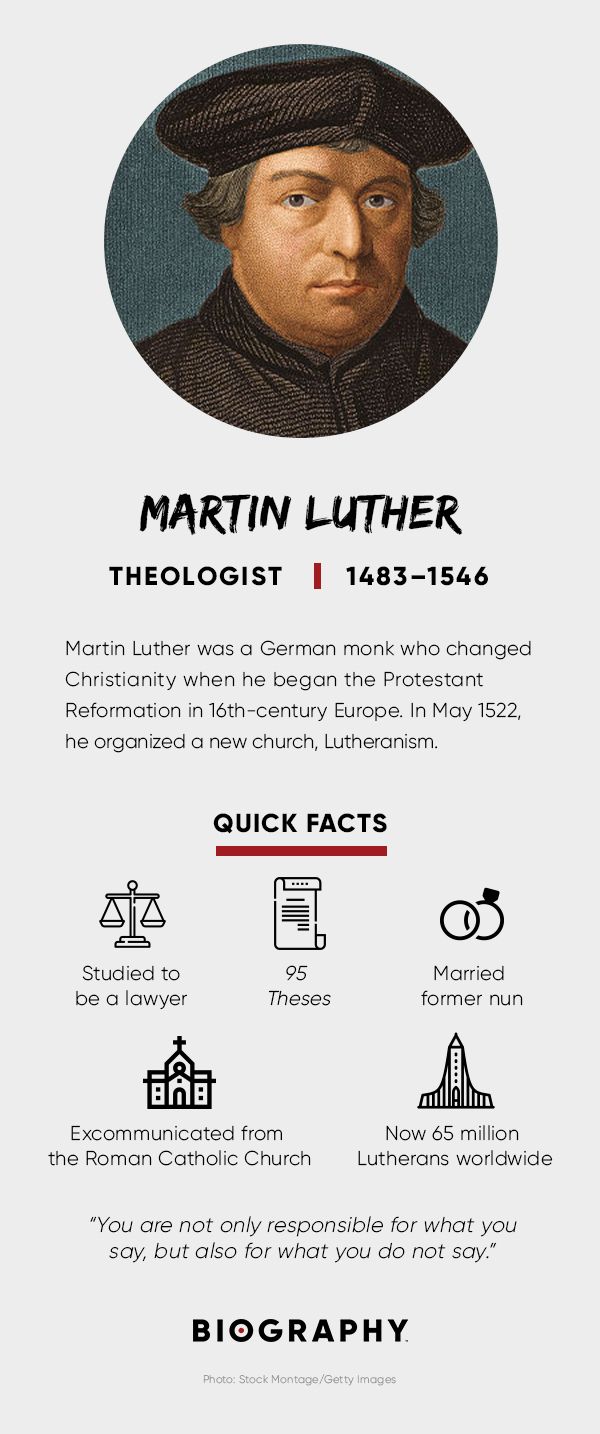
'95 Theses'
On October 31, 1517, Luther, angry with Pope Leo X’s new round of indulgences to help build St. Peter’s Basilica , nailed a sheet of paper with his 95 Theses on the University of Wittenberg’s chapel door.
Though Luther intended these to be discussion points, the 95 Theses laid out a devastating critique of the indulgences - good works, which often involved monetary donations, that popes could grant to the people to cancel out penance for sins - as corrupting people’s faith.
Luther also sent a copy to Archbishop Albert Albrecht of Mainz, calling on him to end the sale of indulgences. Aided by the printing press , copies of the 95 Theses spread throughout Germany within two weeks and throughout Europe within two months.
The Church eventually moved to stop the act of defiance. In October 1518, at a meeting with Cardinal Thomas Cajetan in Augsburg, Luther was ordered to recant his 95 Theses by the authority of the pope.
Luther said he would not recant unless scripture proved him wrong. He went further, stating he didn’t consider that the papacy had the authority to interpret scripture. The meeting ended in a shouting match and initiated his ultimate excommunication from the Church.
Excommunication
Following the publication of his 95 Theses , Luther continued to lecture and write in Wittenberg. In June and July of 1519 Luther publicly declared that the Bible did not give the pope the exclusive right to interpret scripture, which was a direct attack on the authority of the papacy.
Finally, in 1520, the pope had had enough and on June 15 issued an ultimatum threatening Luther with excommunication.
On December 10, 1520, Luther publicly burned the letter. In January 1521, Luther was officially excommunicated from the Roman Catholic Church.
Diet of Worms
In March 1521, Luther was summoned before the Diet of Worms , a general assembly of secular authorities. Again, Luther refused to recant his statements, demanding he be shown any scripture that would refute his position. There was none.
On May 8, 1521, the council released the Edict of Worms, banning Luther’s writings and declaring him a “convicted heretic.” This made him a condemned and wanted man. Friends helped him hide out at the Wartburg Castle.
While in seclusion, he translated the New Testament into the German language, to give ordinary people the opportunity to read God’s word.
Lutheran Church
Though still under threat of arrest, Luther returned to Wittenberg Castle Church, in Eisenach, in May 1522 to organize a new church, Lutheranism.
He gained many followers, and the Lutheran Church also received considerable support from German princes.
When a peasant revolt began in 1524, Luther denounced the peasants and sided with the rulers, whom he depended on to keep his church growing. Thousands of peasants were killed, but the Lutheran Church grew over the years.
Katharina von Bora
In 1525, Luther married Katharina von Bora, a former nun who had abandoned the convent and taken refuge in Wittenberg.
Born into a noble family that had fallen on hard times, at the age of five Katharina was sent to a convent. She and several other reform-minded nuns decided to escape the rigors of the cloistered life, and after smuggling out a letter pleading for help from the Lutherans, Luther organized a daring plot.
With the help of a fishmonger, Luther had the rebellious nuns hide in herring barrels that were secreted out of the convent after dark - an offense punishable by death. Luther ensured that all the women found employment or marriage prospects, except for the strong-willed Katharina, who refused all suitors except Luther himself.
The scandalous marriage of a disgraced monk to a disgraced nun may have somewhat tarnished the reform movement, but over the next several years, the couple prospered and had six children.
Katharina proved herself a more than a capable wife and ally, as she greatly increased their family's wealth by shrewdly investing in farms, orchards and a brewery. She also converted a former monastery into a dormitory and meeting center for Reformation activists.
Luther later said of his marriage, "I have made the angels laugh and the devils weep." Unusual for its time, Luther in his will entrusted Katharina as his sole inheritor and guardian of their children.
Anti-Semitism
From 1533 to his death in 1546, Luther served as the dean of theology at University of Wittenberg. During this time he suffered from many illnesses, including arthritis, heart problems and digestive disorders.
The physical pain and emotional strain of being a fugitive might have been reflected in his writings.
Some works contained strident and offensive language against several segments of society, particularly Jews and, to a lesser degree, Muslims. Luther's anti-Semitism is on full display in his treatise, The Jews and Their Lies .
Luther died following a stroke on February 18, 1546, at the age of 62 during a trip to his hometown of Eisleben. He was buried in All Saints' Church in Wittenberg, the city he had helped turn into an intellectual center.
Luther's teachings and translations radically changed Christian theology. Thanks in large part to the Gutenberg press, his influence continued to grow after his death, as his message spread across Europe and around the world.
QUICK FACTS
- Name: Luther Martin
- Birth Year: 1483
- Birth date: November 10, 1483
- Birth City: Eisleben
- Birth Country: Germany
- Gender: Male
- Best Known For: Martin Luther was a German monk who forever changed Christianity when he nailed his '95 Theses' to a church door in 1517, sparking the Protestant Reformation.
- Christianity
- Astrological Sign: Scorpio
- Nacionalities
- Interesting Facts
- Martin Luther studied to be a lawyer before deciding to become a monk.
- Luther refused to recant his '95 Theses' and was excommunicated from the Catholic Church.
- Luther married a former nun and they went on to have six children.
- Death Year: 1546
- Death date: February 18, 1546
- Death City: Eisleben
- Death Country: Germany
We strive for accuracy and fairness.If you see something that doesn't look right, contact us !
CITATION INFORMATION
- Article Title: Martin Luther Biography
- Author: Biography.com Editors
- Website Name: The Biography.com website
- Url: https://www.biography.com/religious-figures/martin-luther
- Access Date:
- Publisher: A&E; Television Networks
- Last Updated: September 20, 2019
- Original Published Date: April 2, 2014
- To be a Christian without prayer is no more possible than to be alive without breathing.
- God writes the Gospel not in the Bible alone, but also on trees, and in the flowers and clouds and stars.
- Let the wife make the husband glad to come home, and let him make her sorry to see him leave.
- You are not only responsible for what you say, but also for what you do not say.
Famous Religious Figures
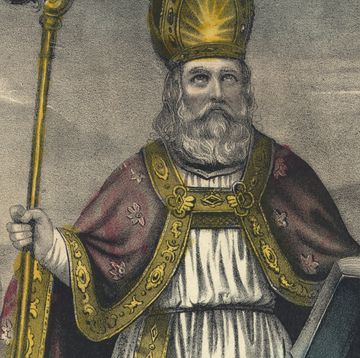
Saint Nicholas

Jerry Falwell

Bhagwan Shree Rajneesh
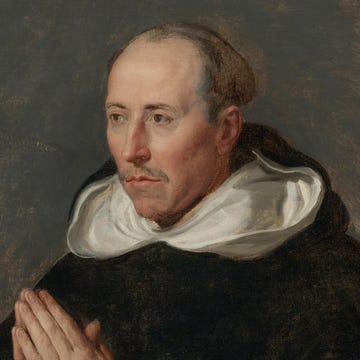
Saint Thomas Aquinas

History of the Dalai Lama's Biggest Controversies
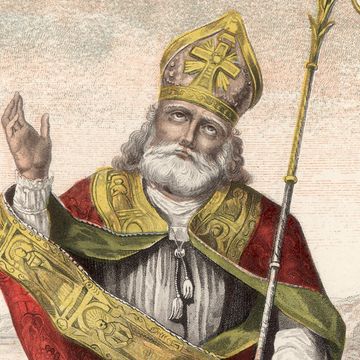
Saint Patrick
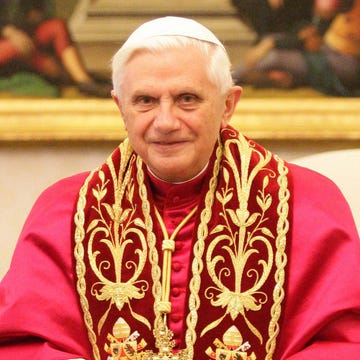
Pope Benedict XVI
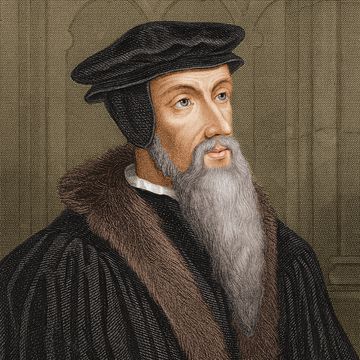
John Calvin

Pontius Pilate
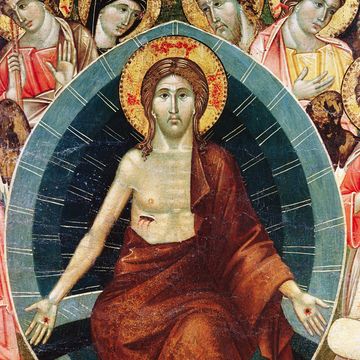
Jesus Christ
- Art History
- U.S. History
- World History
Martin Luther’s Theses: A Turning Point in Church History
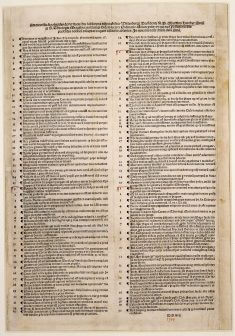
A single page printing of Ninety-five Theses in two columns
Martin Luther’s Theses stand as a pivotal moment in the annals of religious history, heralding a seismic shift that reverberated across Europe and beyond. Nailed to the door of the Castle Church in Wittenberg in 1517, these 95 propositions challenged the established norms of the Catholic Church and ignited the flames of the Protestant Reformation. At its core, Luther’s impassioned critique questioned the theological foundations of indulgences, condemning what he saw as corruption and exploitation within the Church. Yet, beyond mere theological debate, Luther’s Theses catalyzed a movement that fundamentally altered the social, political, and cultural landscape of Europe, forever reshaping the tapestry of religious belief and practice. Join us as we journey into the heart of Luther’s challenge to authority, exploring its profound impact and enduring legacy.
The Context of Luther’s Theses
The early 16th century was a period of profound religious, social, and cultural upheaval in Europe. The Catholic Church, which had been the dominant spiritual authority for centuries, found itself at the center of growing criticism and dissatisfaction. This discontent was fueled by a range of factors, including clerical abuse, corruption, and the perceived moral decay within the Church hierarchy. Among the practices that drew the most ire was the sale of indulgences, a practice that had grown increasingly common and commercialized by the Church.
Indulgences were promoted as a way for believers to reduce the amount of punishment one had to undergo for sins in purgatory, based on the Church’s authority to grant remission of temporal punishment for sins that had already been forgiven in confession. They were initially introduced as a means to offer Christians a path of penance, but by the 16th century, the sale of indulgences had become a lucrative revenue source for the Church. This commercialization of forgiveness, often presented as a transactional exchange between the faithful and the Church, sparked widespread controversy and debate.
Martin Luther, a German monk, theologian, and university professor, became one of the most vocal critics of the indulgence system. Luther’s theological studies and deep commitment to the principles of Christianity led him to question the biblical foundation of indulgences. He argued that forgiveness was a matter of faith and repentance between the believer and God, not something that could be bought or sold. Luther’s concern was not only theological but also pastoral; he was troubled by the impact of indulgence sales on the spiritual welfare of his parishioners, many of whom were impoverished and anxious for the salvation of their souls.
Luther’s growing disillusionment with the Church’s practices culminated in the drafting of his Ninety-five Theses in 1517. This document, which he reputedly nailed to the door of the Castle Church in Wittenberg, was initially intended as an invitation to debate. However, the Theses quickly became a manifesto against the corruption within the Church, particularly targeting the sale of indulgences. Luther’s challenge to Church authority and his call for reform based on a return to biblical teachings ignited a religious and cultural revolution that would lead to the Protestant Reformation, fundamentally altering the course of Western Christianity.
Luther’s Ninety-five Theses
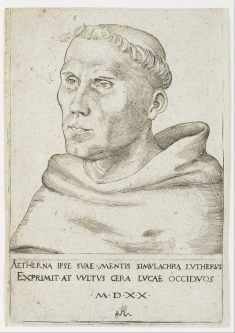
A 1520 engraving of Luther as a friar with a tonsure
Martin Luther’s Ninety-five Theses, formally titled “Disputation on the Power and Efficacy of Indulgences,” were a seminal critique of specific practices within the Catholic Church, most notably the sale of indulgences. Drafted in 1517, Luther’s Theses challenged the Church’s claim that salvation could be secured through the purchase of indulgences, which were marketed as a way to reduce the punishment for sins in purgatory. Luther contended that this practice exploited the faithful, distorted the true nature of repentance, and undermined the core Christian doctrine that salvation was granted by grace through faith in Jesus Christ alone.
At the heart of Luther’s argument was the principle of “sola fide” (faith alone), which posited that faith in Christ was the sole means of achieving salvation, a stark contrast to the Church’s teaching that salvation could be influenced by human actions, including the purchase of indulgences. Luther also critiqued the Church’s authority to issue indulgences, questioning the pope’s power to release souls from purgatory and challenging the theological foundations upon which the practice was justified.
The Theses were initially intended for scholarly debate, aimed at inviting discussion among theologians and Church officials. However, their translation from Latin into German and subsequent dissemination through the printing press transformed them into a catalyst for widespread public debate and controversy. The rapid spread of Luther’s ideas was unprecedented, facilitated by the relatively recent invention of the printing press by Johannes Gutenberg in the mid-15th century. This technology allowed for the swift replication and distribution of texts, enabling Luther’s Theses to reach a broad audience beyond the academic and ecclesiastical circles.
The distribution of the Ninety-five Theses across Europe ignited a religious, cultural, and political firestorm. Luther’s challenge to the Church’s practices and authority resonated with a populace increasingly disillusioned with clerical corruption and the financial exploitation of the faithful. The Theses not only exposed the theological rifts within Christianity but also tapped into broader social and economic tensions, contributing to the rise of the Protestant Reformation. This movement, spearheaded by Luther’s initial act of defiance, would lead to the establishment of Protestant churches and fundamentally alter the religious landscape of Europe, challenging the hegemony of the Catholic Church and laying the groundwork for centuries of religious reform and conflict.
The Impact of the Theses
Martin Luther’s Ninety-five Theses, nailed to the door of the Castle Church in Wittenberg in 1517, reverberated across Europe with unprecedented force, igniting a profound upheaval in the religious landscape of the time. The audacious challenge to the authority and practices of the Catholic Church sent shockwaves through society, sparking intense controversy and debate that reverberated far beyond the confines of Wittenberg.
The Catholic Church, deeply entrenched in its centuries-old traditions and hierarchical structures, swiftly condemned Luther’s Theses as heretical and blasphemous. The ecclesiastical establishment, led by Pope Leo X, viewed Luther’s criticisms as a direct assault on its spiritual authority and a threat to the unity of Christendom. Consequently, Luther faced vehement opposition and censure from Church officials, who sought to suppress his dissent and maintain the status quo.
However, amidst the condemnation from religious authorities, Luther’s Theses resonated profoundly with a wide swath of the European populace, particularly among the disenfranchised and disillusioned. Many ordinary people, disillusioned by the perceived corruption and excesses within the Church, found solace in Luther’s bold denunciation of indulgences and his call for a return to the fundamental tenets of Christianity. The Theses struck a chord with those who yearned for spiritual renewal and a more authentic expression of faith, galvanizing support for Luther’s cause among the masses.
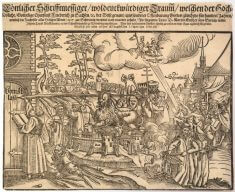
Print made for the 1617 Reformation Jubilee showing Luther inscribing the Theses on the Wittenberg church door with a giant quill
The dissemination of Luther’s ideas was facilitated by the recent advent of the printing press, which enabled the rapid and widespread distribution of his writings throughout Europe. Luther’s treatises, including the Ninety-five Theses, circulated widely, fueling a burgeoning movement of dissent and reform that transcended national boundaries. Intellectuals, scholars, and religious reformers rallied behind Luther’s call for a reformation of the Church, laying the groundwork for a seismic shift in religious consciousness.
The impact of Luther’s Theses extended far beyond mere theological debate; it heralded the dawn of a profound transformation in the Christian faith. The burgeoning movement sparked by Luther’s challenge to ecclesiastical authority ultimately coalesced into Protestantism, a diverse and multifaceted religious tradition that rejected papal supremacy and embraced principles of individual conscience and scriptural interpretation. The emergence of Protestantism shattered the monolithic unity of Western Christianity, giving rise to a plurality of religious beliefs and denominations that would shape the religious landscape of Europe and beyond for centuries to come.
The Aftermath
In the aftermath of the publication of his Ninety-five Theses, Martin Luther found himself increasingly emboldened in his defiance against the Catholic Church’s authority. His steadfast commitment to reforming the Church led him to adopt increasingly radical beliefs and actions, which ultimately resulted in his excommunication by Pope Leo X in 1521. Subsequently, Luther was declared an outlaw by the Holy Roman Emperor, further solidifying his status as a pariah in the eyes of the ecclesiastical and secular authorities.
Undeterred by the formidable opposition he faced, Luther remained undaunted in his mission to challenge the entrenched dogma and practices of the Catholic Church. Despite being branded a heretic and subjected to persecution, he continued to preach, teach, and write prolifically, disseminating his revolutionary ideas throughout Europe. Through his sermons, pamphlets, and treatises, Luther galvanized a growing community of followers who shared his vision for a reformed Christianity based on principles of sola scriptura (scripture alone) and sola fide (faith alone).
The repercussions of Luther’s defiance were profound and far-reaching, extending beyond the realm of religion to encompass the political and social fabric of European society. The Protestant Reformation unleashed a wave of religious fervor and ideological ferment that reverberated across the continent, igniting religious wars, political upheaval, and social unrest. The division of Europe into Catholic and Protestant territories deepened existing fault lines and precipitated decades of conflict, including the devastating Thirty Years’ War, which ravaged much of Central Europe in the 17th century.
Nevertheless, Luther’s legacy endured, as the Protestant movement he catalyzed continued to evolve and proliferate in the centuries that followed. Protestantism emerged as a potent force within the Christian world, encompassing a diverse array of theological traditions and denominational affiliations. The principles espoused by Luther – including the primacy of scripture, the priesthood of all believers, and justification by faith – resonated with millions of adherents, shaping the religious landscape of Europe and beyond.
Newest Additions
- The Beheading of John the Baptist
- Jesus Sends Out His Twelve Apostles
- The Miracle of Healing: Jesus and the Paralytic
- Parables of Wisdom: The Teachings of Jesus
- Jesus’ Response to John’s Disciples
Copyright © 2020 · Totallyhistory.com · All Rights Reserved. | Terms of Use | Privacy Policy | Contact Us
by Dr. Martin Luther, 1517
Disputation of Doctor Martin Luther on the Power and Efficacy of Indulgences by Dr. Martin Luther (1517)
Out of love for the truth and the desire to bring it to light, the following propositions will be discussed at Wittenberg, under the presidency of the Reverend Father Martin Luther, Master of Arts and of Sacred Theology, and Lecturer in Ordinary on the same at that place. Wherefore he requests that those who are unable to be present and debate orally with us, may do so by letter. In the Name our Lord Jesus Christ. Amen. 1. Our Lord and Master Jesus Christ, when He said Poenitentiam agite, willed that the whole life of believers should be repentance. 2. This word cannot be understood to mean sacramental penance, i.e., confession and satisfaction, which is administered by the priests. 3. Yet it means not inward repentance only; nay, there is no inward repentance which does not outwardly work divers mortifications of the flesh. 4. The penalty [of sin], therefore, continues so long as hatred of self continues; for this is the true inward repentance, and continues until our entrance into the kingdom of heaven. 5. The pope does not intend to remit, and cannot remit any penalties other than those which he has imposed either by his own authority or by that of the Canons. 6. The pope cannot remit any guilt, except by declaring that it has been remitted by God and by assenting to God's remission; though, to be sure, he may grant remission in cases reserved to his judgment. If his right to grant remission in such cases were despised, the guilt would remain entirely unforgiven. 7. God remits guilt to no one whom He does not, at the same time, humble in all things and bring into subjection to His vicar, the priest. 8. The penitential canons are imposed only on the living, and, according to them, nothing should be imposed on the dying. 9. Therefore the Holy Spirit in the pope is kind to us, because in his decrees he always makes exception of the article of death and of necessity. 10. Ignorant and wicked are the doings of those priests who, in the case of the dying, reserve canonical penances for purgatory. 11. This changing of the canonical penalty to the penalty of purgatory is quite evidently one of the tares that were sown while the bishops slept. 12. In former times the canonical penalties were imposed not after, but before absolution, as tests of true contrition. 13. The dying are freed by death from all penalties; they are already dead to canonical rules, and have a right to be released from them. 14. The imperfect health [of soul], that is to say, the imperfect love, of the dying brings with it, of necessity, great fear; and the smaller the love, the greater is the fear. 15. This fear and horror is sufficient of itself alone (to say nothing of other things) to constitute the penalty of purgatory, since it is very near to the horror of despair. 16. Hell, purgatory, and heaven seem to differ as do despair, almost-despair, and the assurance of safety. 17. With souls in purgatory it seems necessary that horror should grow less and love increase. 18. It seems unproved, either by reason or Scripture, that they are outside the state of merit, that is to say, of increasing love. 19. Again, it seems unproved that they, or at least that all of them, are certain or assured of their own blessedness, though we may be quite certain of it. 20. Therefore by "full remission of all penalties" the pope means not actually "of all," but only of those imposed by himself. 21. Therefore those preachers of indulgences are in error, who say that by the pope's indulgences a man is freed from every penalty, and saved; 22. Whereas he remits to souls in purgatory no penalty which, according to the canons, they would have had to pay in this life. 23. If it is at all possible to grant to any one the remission of all penalties whatsoever, it is certain that this remission can be granted only to the most perfect, that is, to the very fewest. 24. It must needs be, therefore, that the greater part of the people are deceived by that indiscriminate and highsounding promise of release from penalty. 25. The power which the pope has, in a general way, over purgatory, is just like the power which any bishop or curate has, in a special way, within his own diocese or parish. 26. The pope does well when he grants remission to souls [in purgatory], not by the power of the keys (which he does not possess), but by way of intercession. 27. They preach man who say that so soon as the penny jingles into the money-box, the soul flies out [of purgatory]. 28. It is certain that when the penny jingles into the money-box, gain and avarice can be increased, but the result of the intercession of the Church is in the power of God alone. 29. Who knows whether all the souls in purgatory wish to be bought out of it, as in the legend of Sts. Severinus and Paschal. 30. No one is sure that his own contrition is sincere; much less that he has attained full remission. 31. Rare as is the man that is truly penitent, so rare is also the man who truly buys indulgences, i.e., such men are most rare. 32. They will be condemned eternally, together with their teachers, who believe themselves sure of their salvation because they have letters of pardon. 33. Men must be on their guard against those who say that the pope's pardons are that inestimable gift of God by which man is reconciled to Him; 34. For these "graces of pardon" concern only the penalties of sacramental satisfaction, and these are appointed by man. 35. They preach no Christian doctrine who teach that contrition is not necessary in those who intend to buy souls out of purgatory or to buy confessionalia. 36. Every truly repentant Christian has a right to full remission of penalty and guilt, even without letters of pardon. 37. Every true Christian, whether living or dead, has part in all the blessings of Christ and the Church; and this is granted him by God, even without letters of pardon. 38. Nevertheless, the remission and participation [in the blessings of the Church] which are granted by the pope are in no way to be despised, for they are, as I have said, the declaration of divine remission. 39. It is most difficult, even for the very keenest theologians, at one and the same time to commend to the people the abundance of pardons and [the need of] true contrition. 40. True contrition seeks and loves penalties, but liberal pardons only relax penalties and cause them to be hated, or at least, furnish an occasion [for hating them]. 41. Apostolic pardons are to be preached with caution, lest the people may falsely think them preferable to other good works of love. 42. Christians are to be taught that the pope does not intend the buying of pardons to be compared in any way to works of mercy. 43. Christians are to be taught that he who gives to the poor or lends to the needy does a better work than buying pardons; 44. Because love grows by works of love, and man becomes better; but by pardons man does not grow better, only more free from penalty. 45. 45. Christians are to be taught that he who sees a man in need, and passes him by, and gives [his money] for pardons, purchases not the indulgences of the pope, but the indignation of God. 46. Christians are to be taught that unless they have more than they need, they are bound to keep back what is necessary for their own families, and by no means to squander it on pardons. 47. Christians are to be taught that the buying of pardons is a matter of free will, and not of commandment. 48. Christians are to be taught that the pope, in granting pardons, needs, and therefore desires, their devout prayer for him more than the money they bring. 49. Christians are to be taught that the pope's pardons are useful, if they do not put their trust in them; but altogether harmful, if through them they lose their fear of God. 50. Christians are to be taught that if the pope knew the exactions of the pardon-preachers, he would rather that St. Peter's church should go to ashes, than that it should be built up with the skin, flesh and bones of his sheep. 51. Christians are to be taught that it would be the pope's wish, as it is his duty, to give of his own money to very many of those from whom certain hawkers of pardons cajole money, even though the church of St. Peter might have to be sold. 52. The assurance of salvation by letters of pardon is vain, even though the commissary, nay, even though the pope himself, were to stake his soul upon it. 53. They are enemies of Christ and of the pope, who bid the Word of God be altogether silent in some Churches, in order that pardons may be preached in others. 54. Injury is done the Word of God when, in the same sermon, an equal or a longer time is spent on pardons than on this Word. 55. It must be the intention of the pope that if pardons, which are a very small thing, are celebrated with one bell, with single processions and ceremonies, then the Gospel, which is the very greatest thing, should be preached with a hundred bells, a hundred processions, a hundred ceremonies. 56. The "treasures of the Church," out of which the pope. grants indulgences, are not sufficiently named or known among the people of Christ. 57. That they are not temporal treasures is certainly evident, for many of the vendors do not pour out such treasures so easily, but only gather them. 58. Nor are they the merits of Christ and the Saints, for even without the pope, these always work grace for the inner man, and the cross, death, and hell for the outward man. 59. St. Lawrence said that the treasures of the Church were the Church's poor, but he spoke according to the usage of the word in his own time. 60. Without rashness we say that the keys of the Church, given by Christ's merit, are that treasure; 61. For it is clear that for the remission of penalties and of reserved cases, the power of the pope is of itself sufficient. 62. The true treasure of the Church is the Most Holy Gospel of the glory and the grace of God. 63. But this treasure is naturally most odious, for it makes the first to be last. 64. On the other hand, the treasure of indulgences is naturally most acceptable, for it makes the last to be first. 65. Therefore the treasures of the Gospel are nets with which they formerly were wont to fish for men of riches. 66. The treasures of the indulgences are nets with which they now fish for the riches of men. 67. The indulgences which the preachers cry as the "greatest graces" are known to be truly such, in so far as they promote gain. 68. Yet they are in truth the very smallest graces compared with the grace of God and the piety of the Cross. 69. Bishops and curates are bound to admit the commissaries of apostolic pardons, with all reverence. 70. But still more are they bound to strain all their eyes and attend with all their ears, lest these men preach their own dreams instead of the commission of the pope. 71. He who speaks against the truth of apostolic pardons, let him be anathema and accursed! 72. But he who guards against the lust and license of the pardon-preachers, let him be blessed! 73. The pope justly thunders against those who, by any art, contrive the injury of the traffic in pardons. 74. But much more does he intend to thunder against those who use the pretext of pardons to contrive the injury of holy love and truth. 75. To think the papal pardons so great that they could absolve a man even if he had committed an impossible sin and violated the Mother of God -- this is madness. 76. We say, on the contrary, that the papal pardons are not able to remove the very least of venial sins, so far as its guilt is concerned. 77. It is said that even St. Peter, if he were now Pope, could not bestow greater graces; this is blasphemy against St. Peter and against the pope. 78. We say, on the contrary, that even the present pope, and any pope at all, has greater graces at his disposal; to wit, the Gospel, powers, gifts of healing, etc., as it is written in I. Corinthians xii. 79. To say that the cross, emblazoned with the papal arms, which is set up [by the preachers of indulgences], is of equal worth with the Cross of Christ, is blasphemy. 80. The bishops, curates and theologians who allow such talk to be spread among the people, will have an account to render. 81. This unbridled preaching of pardons makes it no easy matter, even for learned men, to rescue the reverence due to the pope from slander, or even from the shrewd questionings of the laity. 82. To wit: -- "Why does not the pope empty purgatory, for the sake of holy love and of the dire need of the souls that are there, if he redeems an infinite number of souls for the sake of miserable money with which to build a Church? The former reasons would be most just; the latter is most trivial." 83. Again: -- "Why are mortuary and anniversary masses for the dead continued, and why does he not return or permit the withdrawal of the endowments founded on their behalf, since it is wrong to pray for the redeemed?" 84. Again: -- "What is this new piety of God and the pope, that for money they allow a man who is impious and their enemy to buy out of purgatory the pious soul of a friend of God, and do not rather, because of that pious and beloved soul's own need, free it for pure love's sake?" 85. Again: -- "Why are the penitential canons long since in actual fact and through disuse abrogated and dead, now satisfied by the granting of indulgences, as though they were still alive and in force?" 86. Again: -- "Why does not the pope, whose wealth is to-day greater than the riches of the richest, build just this one church of St. Peter with his own money, rather than with the money of poor believers?" 87. Again: -- "What is it that the pope remits, and what participation does he grant to those who, by perfect contrition, have a right to full remission and participation?" 88. Again: -- "What greater blessing could come to the Church than if the pope were to do a hundred times a day what he now does once, and bestow on every believer these remissions and participations?" 89. "Since the pope, by his pardons, seeks the salvation of souls rather than money, why does he suspend the indulgences and pardons granted heretofore, since these have equal efficacy?" 90. To repress these arguments and scruples of the laity by force alone, and not to resolve them by giving reasons, is to expose the Church and the pope to the ridicule of their enemies, and to make Christians unhappy. 91. If, therefore, pardons were preached according to the spirit and mind of the pope, all these doubts would be readily resolved; nay, they would not exist. 92. Away, then, with all those prophets who say to the people of Christ, "Peace, peace," and there is no peace! 93. Blessed be all those prophets who say to the people of Christ, "Cross, cross," and there is no cross! 94. Christians are to be exhorted that they be diligent in following Christ, their Head, through penalties, deaths, and hell; 95. And thus be confident of entering into heaven rather through many tribulations, than through the assurance of peace.
This text was converted to ASCII text for Project Wittenberg by Allen Mulvey, and is in the public domain. You may freely distribute, copy or print this text. Please direct any comments or suggestions to:
Rev. Robert E. Smith Walther Library Concordia Theological Seminary.
E-mail: [email protected] Surface Mail: 6600 N. Clinton St., Ft. Wayne, IN 46825 USA Phone: (260) 452-3149 - Fax: (260) 452-2126
How to go to Heaven
How to get right with god.

What are the 95 Theses of Martin Luther?
For further study, related articles, subscribe to the, question of the week.
Get our Question of the Week delivered right to your inbox!

Martin Luther’s 95 Theses Are 500 Years Old. Here’s Why They’re Still Causing Controversy
Five hundred years ago , on Oct. 31, 1517, the small-town monk Martin Luther marched up to the castle church in Wittenberg and nailed his 95 Theses to the door, thus lighting the flame of the Reformation — the split between the Catholic and Protestant churches. Luther’s act is taught as one of the cornerstones of world history, and remains a lasting symbol of resistance five centuries later.
But that’s not actually what happened — or at least that’s the argument of some historians, even as the Protestant world celebrates the anniversary.
“The drama of Luther walking through Wittenberg with his hammer and his nails is very, very unlikely to have happened,” says Professor Andrew Pettegree, an expert on the Reformation from the University of St. Andrews, Scotland. “The castle church door was the normal noticeboard of the university. This was not an act of defiance on Luther’s part, it was simply what you did to make a formal publication. It would probably have been pasted to the door rather than nailed up.”
Peter Marshall would go even further. A historian of the Reformation at Warwick University, England, he believes there’s a strong case to be made that the Theses were never posted at all, and that the story was invented to suit the political needs of people who came later. “The incident was first recorded nearly 30 years after,” he says. “Luther himself never mentioned it. There was very little discussion of the nailing of the Theses before the first Reformation anniversary of 1617.”
In 1617, with the Thirty Years’ War on the horizon, a local ruler in the Rhineland area had the idea of organizing a centenary celebration to drum up Protestant solidarity, to increase his chances in the forthcoming fight with the Catholic Habsburgs. “It’s a very good example of history being made because of a current need to create a historical event,” says Pettegree, with an air of admiration.
But even if 2017’s big quincentenary isn’t quite what it seems, the legend that has grown up around the story of Luther nailing his Theses to the church door follows a precedent of historical events that have been remembered differently from the way they actually happened.
Memorials, whether state-led, socially constructed or personal, often do more than simply commemorate an anniversary.
Over the centuries, that 1517 date has been seen in a number of different ways. During the 400th anniversary in 1917, for example, the First World War was raging. At that time, Marshall says, Germans saw Luther’s posting of the Theses “as a quintessentially German and nationalist action — he was ‘ unser Luther ‘, our Luther.” That idea, in turn, was used to bolster German nationalism and morale during the war.
Over the following decades, the image was co-opted for different political ends. “The Nazis also appropriated the imagery of the posting of the Theses for their own purposes,” Marshall adds. “They saw themselves overthrowing a corrupt old order.”
Ironically, Luther would have hated to be seen as the calculating revolutionary who overthrew the old order, and most historians agree he wasn’t looking to start a “Reformation” in 1517. “Luther always thought of himself as a good Catholic,” Pettegree insists.
Today it’s the Catholic and Lutheran churches, more so than nation states, that are taking the memory of 1517 in their hands. This time last year, on the 499th anniversary, Pope Francis joined leaders of the Lutheran World Federation in Sweden to hold a joint service in a spirit of unity after 500 years of division. “We have the opportunity to mend a critical moment of our history by moving beyond the controversies and disagreements that have often prevented us from understanding one another,” he told the congregation.
Both churches are keen to use the anniversary to signal a definitive break with the past — another example of the way a memorial can be used for any number of ends.
“I suppose the danger with anniversaries is that they can serve to reinforce myths and entrenched narratives of the past, rather than encourage us to look afresh at historical events and processes,” Marshall says. “And there’s been a fair amount, especially in Germany, of uncritical celebration of the ‘achievements’ or ‘legacies’ of the Reformation — tolerance, liberal democracy, freedom of expression, scientific rationalism. All things Luther would have hated!”
More Must-Reads From TIME
- Jane Fonda Champions Climate Action for Every Generation
- Biden’s Campaign Is In Trouble. Will the Turnaround Plan Work?
- Why We're Spending So Much Money Now
- The Financial Influencers Women Actually Want to Listen To
- Breaker Sunny Choi Is Heading to Paris
- Why TV Can’t Stop Making Silly Shows About Lady Journalists
- The Case for Wearing Shoes in the House
- Want Weekly Recs on What to Watch, Read, and More? Sign Up for Worth Your Time
Write to Billy Perrigo at [email protected]
You May Also Like
Luther: The Battle Against Satan (Part 3) The Rest Is History
Listen on Apple Podcasts Requires subscription and macOS 11.4 or higher
Three years on from Martin Luther’s publication of the Ninety-Five Theses - a shocking attack on the corruption of the Catholic Church and the selling of indulgences - his radical new ideas and brilliant use of the printing press had unleashed chaos in Christendom. Still in Wittenberg under the Protection of Frederick III, Luther’s increasingly radical beliefs founded in his readings of Christian scripture, now sought to undermine the entire fabric of the Catholic Church and the theology that has shaped the Latin West for centuries. This culminated in his famous Reformation Moment, which saw his love affair with God raised to new heights of exultation. All the while, support for his outrageous ideas was swelling and Luther’s own celebrity growing. With it, the very real danger in which he placed himself, and the looming threat of excommunication. At last, in August 1518 Luther was summoned to Augsburg to meet with Cardinal Thomas Cajetan and have his beliefs examined…would he survive the reckoning to come? Join Tom and Dominic as they discuss the raging fires of Luther’s radical revolution, his seminal Reformation Moment, and the great debate in Augsburg which would see his fervour put to the test. *The Rest Is History LIVE in 2024* Tom and Dominic are back onstage this summer, at Hampton Court Palace in London! Buy your tickets here: therestishistory.com Twitter: @TheRestHistory @holland_tom @dcsandbrook Producer: Theo Young-Smith Assistant Producer: Tabby Syrett Executive Producers: Jack Davenport + Tony Pastor Learn more about your ad choices. Visit podcastchoices.com/adchoices
- More Episodes
- Goalhanger Podcasts
Top Podcasts In History
More by goalhanger films.

IMAGES
VIDEO
COMMENTS
The 95 Theses. Out of love for the truth and from desire to elucidate it, the Reverend Father Martin Luther, Master of Arts and Sacred Theology, and ordinary lecturer therein at Wittenberg, intends to defend the following statements and to dispute on them in that place. Therefore he asks that those who cannot be present and dispute with him ...
Ninety-five Theses. The Ninety-five Theses or Disputation on the Power and Efficacy of Indulgences [a] is a list of propositions for an academic disputation written in 1517 by Martin Luther, then a professor of moral theology at the University of Wittenberg, Germany. [b] The Theses is retrospectively considered to have launched the Protestant ...
The Ninety-five Theses by Martin Luther October 31, 1517, Wittenberg, Germany 2 Theses #15 - 82 are the core arguments by Martin Luther against indulgences and the tactics of the preachers who are selling letters of indulgence in Germany. 15. This fear of horror is sufficient in itself, to say nothing of other things, to constitute the
Luther's 97 theses on the topic of scholastic theology had been posted only a month before his 95 theses focusing on the sale of indulgences. Both writs were only intended to invite discussion of the topic. Martin Luther (l. 1483-1546) objected to scholastic theology on the grounds that it could not reveal the truth of God and denounced indulgences - writs sold by the Church to shorten one's ...
Martin Luther was a German theologian who challenged a number of teachings of the Roman Catholic Church. His 1517 document, "95 Theses," sparked the Protestant Reformation. Read a summary of the ...
Ninety-five Theses, propositions for debate concerned with the question of indulgences, written in Latin and possibly posted by Martin Luther on the door of the Castle Church in Wittenberg on October 31, 1517. The event came to be considered the beginning of the Protestant Reformation.
Ninety-five Theses, Propositions for debate on the question of indulgences, written by Martin Luther and, according to legend, posted on the door of the castle church in Wittenberg, Ger., on Oct. 31, 1517. This event is now seen as the beginning of the Protestant Reformation. The theses were written in response to the selling of indulgences to pay for the rebuilding of St. Peter's Basilica ...
On 31 October 1517, Martin Luther pinned the 95 Theses next to the sale of indulgences to the door of the main church in Wittenberg. Although Luther could never have foreseen the impact of this act, it served to trigger the German Reformation. The main idea of the 95 Theses was that the Church's teaching on salvation were incorrect and that the Bible revealed God's true will.
Protestantism - Reformation, Luther, 95 Theses: Against the actions of Albert and Tetzel and with no intention to divide the church, Luther launched his Ninety-five Theses on October 31, 1517. In the theses he presented three main points. The first concerned financial abuses; for example, if the pope realized the poverty of the German people, he would rather that St. Peter's lay in ashes ...
Disputation on the Power and Efficacy of Indulgences. In 1517, Martin Luther, an Augustinian monk posted upon the door of the Castle Church in Wittenberg (in the manner common to those issuing bulletin of an upcoming event or debate) the Ninety-Five Theses on the Power of Indulgences, what has commonly become known as The Ninety-Five Theses.
Martin Luther. "The Ninety Five Theses" — the common title to his "Disputation on the Power and Efficacy of Indulgences" — is more widely associated with Luther's name than anything else he wrote. Luther posted his theses on the castle door at Wittenberg on either October 31 or No-vember 1, 1517. The disputation which Luther ...
This Day in History: 10/31/1517 - Martin Luther Posts Theses. On October 31, 1517, legend has it that the priest and scholar Martin Luther approaches the door of the Castle Church in Wittenberg ...
Project Wittenberg is an electronic text initiative which converts to electronic form the writings of Martin Luther and Other Lutherans. This page is Wittenberg's home page and thus a catalog of the texts available. ... Luther's Ninety-five Theses, amongst an ever growing collection. III. SELECTED HISTORIC WORKS FROM OTHERS: Jakob Andreae (1528 ...
Martin Luther's Explanation of the Ninety-five Theses Selected Excerpts from Luther's Works: Career of the Reformer: 1, Volume 31, Edited by Harold J. Grimm. Fortress Press. Philadelphia Thesis 1 - "When our Lord and Master Jesus Christ said, "Repent" [Matthew 4:17] he willed the entire life of believers to be one of repentance.
by Joshua J. Mark. published on 06 December 2021. Martin Luther's 95 Theses, credited with sparking the Protestant Reformation in Europe, have become a cultural touchstone since he posted them 31 October 1517, but the little-known 97 Theses, posted only a month earlier, are equally significant in the development of Luther's (l. 1483-1546 ...
Martin Luther's Disputatio pro declaratione virtutis indulgentiarum of 1517, commonly known as the Ninety-Five Theses, is considered the central document of the Protestant Reformation. Its complete title reads: "Out of love and zeal for clarifying the truth, these items written below will be debated at Wittenberg. Reverend Father Martin Luther, Master of Arts and of Sacred Theology and an ...
Martin Luther was a German monk who forever changed Christianity when he nailed his '95 Theses' to a church door in 1517, sparking the Protestant Reformation.
Martin Luther's Ninety-five Theses, formally titled "Disputation on the Power and Efficacy of Indulgences," were a seminal critique of specific practices within the Catholic Church, most notably the sale of indulgences. Drafted in 1517, Luther's Theses challenged the Church's claim that salvation could be secured through the purchase ...
491 years ago today, Martin Luther nailed his 95 theses to the church door in Wittenberg. He wanted to debate the sale of indulgences with his fellow university professors. So he wrote in Latin. But a nameless visionary translated the theses into German, carried them to the printing press, and enabled their dispersion far and wide.
13. The dying are freed by death from all penalties; they are already dead to canonical rules, and have a right to be released from them. 14. The imperfect health [of soul], that is to say, the imperfect love, of the dying brings with it, of necessity, great fear; and the smaller the love, the greater is the fear. 15.
Luther never intended, initially, to challenge the church hierarchy or the pope. Martin Luther's 95 Theses of 1517 were an invitation to discuss policies and practices of the Church he found troublesome and unbiblical. The original document, written in Latin, was intended for an ecclesiastical audience, but it was translated into German by his friends and supporters, and thanks to the advent ...
The "95 Theses" were written in 1517 by a German priest and professor of theology named Martin Luther.His revolutionary ideas served as the catalyst for the eventual breaking away from the Catholic Church and were later instrumental in forming the movement known as the Protestant Reformation.
October 31, 2017 9:00 AM EDT. Five hundred years ago, on Oct. 31, 1517, the small-town monk Martin Luther marched up to the castle church in Wittenberg and nailed his 95 Theses to the door, thus ...
Three years on from Martin Luther's publication of the Ninety-Five Theses - a shocking attack on the corruption of the Catholic Church and the selling of indulgences - his radical new ideas and brilliant use of the printing press had unleashed chaos in Christendom. Still in Wittenberg under the Prot…